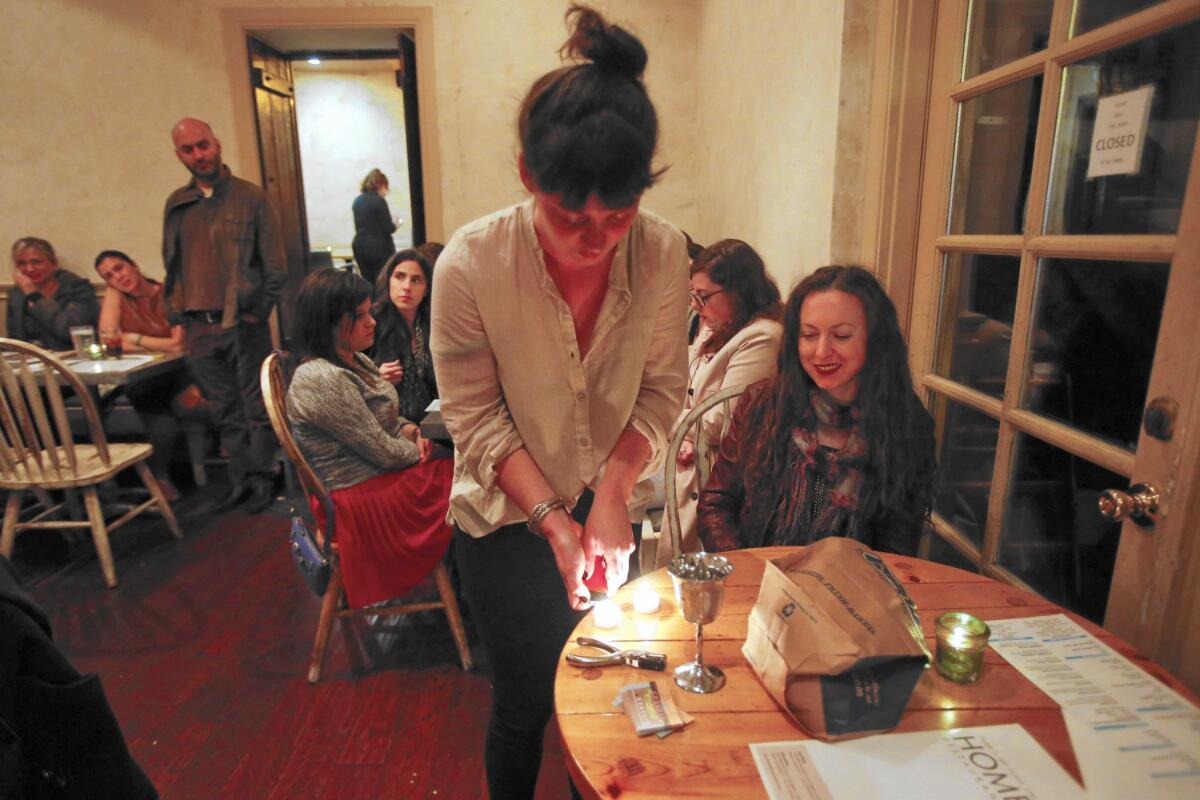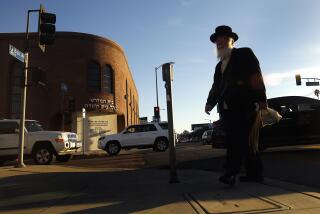For ‘East Side Jews,’ a hipster take on spirituality

In a small, packed room in Los Feliz, young Jewish writers, artists and hipsters with beards, Buddy Holly glasses and a fair amount of flannel sit down to Shabbat dinner.
It’s the last Friday in January, and about 30 self-proclaimed “East Side Jews” are putting an urban spin on the Jewish day of rest. Instead of spending it with their families at home, they have crowded into a homey restaurant with friends, old and new.
There is no lace tablecloth here, none of the fancy candlesticks or special tapers associated with a traditional Shabbat meal.
The fundamentals of the ancient ritual mix with newfangled flourishes: A woman recites three traditional prayers over two tiny tea lights; the prayers are traditional, the tea lights are not. The small Kiddush cup filled with wine and the sesame Challah bread? Traditional. The very humble brown bag that looks like it was snagged from a Vons deli holding the bread? Not a chance.
One man wears a kippah, while another explains that he doesn’t believe in God. A waiter places a not-so-kosher BLT sandwich on one of the tables, while others mix dairy and meat — a very un-kosher move.
Outside, in the drizzling rain, others wait in the cold. Soon they are sent packing to the rain-soaked patio, like churchgoers told that the House of God is sold out tonight.
Some lean against the white doorway, crossing their arms and rolling their eyes, noticeably annoyed that they sat in traffic for two hours or dragged their conservative parents through the downpour just to eat outside.
“We came all the way from Torrance and we can’t get a seat,” a bearded man grumbles while he waits.
::
They call themselves East Side Jews, a nondenominational collective that welcomes people of all faiths and seeks to explore spirituality in unconventional ways.
Technically, their name is open to debate. Although many have moved east from traditional Westside Jewish communities to neighborhoods such as Los Feliz and Silver Lake, virtually none have yet moved back to Los Angeles’ indisputable Eastside lands — Boyle Heights and East L.A. Now an overwhelmingly Catholic and Latino cultural hub, Boyle Heights was once home to the largest Jewish community west of Chicago.
Many in the group say that neighborhoods in the San Fernando Valley or Fairfax district don’t really speak to them politically, culturally or socially. But nouveau Eastside neighborhoods such as Los Feliz still lack the religious and cultural amenities Jews find on the other side of town.
So as the group moved farther east, many left behind their conservative roots and created their own rituals for a do-it-yourself Judaism. Last Sabbath, as the monthly gathering is called, is one of them.
Sitting at the end of a table filled with seven people, Matthew Epstein — who calls himself the king of Shabbos, or the “Sha-Boss” — explains that he has attended every Last Sabbath and hosted two of them.
“I love this group because the community is so laid-back and different,” the 26-year-old says. “From the first time you come, you’re part of a weird, dysfunctional family that loves you.”
His girlfriend, Amanda Gavlick — another member of the group — is of Polish, Slovak, Irish and Welsh background, but she uses the “Jewish stage name” of Klein. The 27-year-old, who has an uncanny resemblance to comic actress Kristen Wiig, moved into a Victorian home in Boyle Heights without knowing of the neighborhood’s Jewish roots. But when she found it, it struck a chord because she had already been thinking about converting to Judaism.
Epstein didn’t grow up in a religious household, but he says everyone needs something to believe in; East Side Jews created a community he could believe in.
“This is a way to get connected in an area where there’s not as many synagogues,” says Dana Plyler, 33. “It’s for people who want to be part of a community regardless of their level of practice. Being Jewish means having a built-in community.”
Teetering on the edge of the booth he sits in, Daniel Kaufman nods in agreement. For him, the sense of community is enough.
“The Westside is conservative. We’re the lefties on the Eastside. The Jewish hipsters. We wear plaid!” he says, laughing as he flexes his arm to show off the blue-gray pattern on his sleeve.
::
A touch of irreverence is the hallmark of these types of events for young Jews. Sure, they will express their Jewish identity, like dancing in circles doing the Hora, but they will start laughing at themselves for it soon after. They are playful and ambivalent toward Judaism, embracing their culture, but not feeling beholden to celebrate it in the customary way.
East Side Jews harks back to the Jewish counterculture of the 1960s and early 1970s, when young Jews grew wary of their parents’ synagogues, says Sarah Benor, an expert in Jewish communities at USC. That generation led the Havurah movement, establishing independent, lay-led prayer communities seen as a response to mainstream Jewish institutions.
East Side Jews is a little different because people are not coming together primarily to pray — it’s more about identity and community. But the group’s gatherings similarly find new ways to speak to a younger generation, Benor says.
And Jewish identity is changing in America. More than 20% of U.S. Jews describe themselves as having no religion, according to a 2013 study by the Pew Research Center.
“A lot of young Jews are opting out and choosing not to do anything Jewish, so organizations see this as countering that trend,” Benor says. “It’s a way of attracting Jews who otherwise wouldn’t be involved.”
::
By 8 p.m., conversations clash into one another amid the clank of forks and knives. One table releases a roar of laughter, heads tilted back and hands clutching at their stomachs. Others drink white wine, toasting with intertwined arms. The “H-word” comes up.
“There’s a stigma around East Side Jews about being hipster,” Epstein says. “But we’re the best Jews in L.A.!”
A woman with raven hair jumps in on the conversation.
“Dude, I’m not a hipster,” Lisa Fogel cries out, cutting off Epstein mid-tirade.
“You’re the most misfit of them all!” Epstein tells her, booming with laughter.
Fogel says that the dinners make her feel as if she is surrounded by family. During one Last Sabbath, she sat next to a married couple and two women who were her mother’s age. They had such a good time, Fogel says, that they all met for another Shabbat dinner outside of Last Sabbath.
“It’s haimish,” she explains, using the Yiddish word for “homey.”
Almost everyone is drinking their poison of choice, laughing with one another in the dimly lit room. When the evening quiets down about 9 p.m and people head home, some are a little tipsy.
“Shabbat shalom!” they say as they trickle out the door.
Twitter: @parviniparlance
More to Read
Sign up for Essential California
The most important California stories and recommendations in your inbox every morning.
You may occasionally receive promotional content from the Los Angeles Times.











